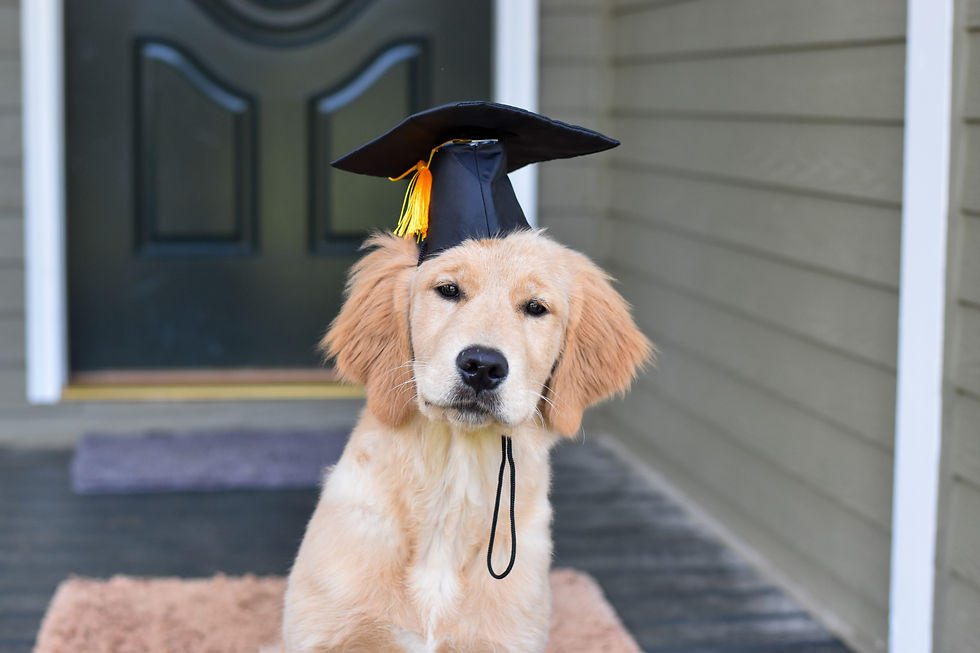What Is a Trained Puppy?
- A Dogs Life Inc.
- Apr 22, 2025
- 3 min read
Updated: Jul 31, 2025
When most people hear “trained puppy,” they imagine a dog that knows how to sit or shake a paw.But that barely scratches the surface.
In our world, a trained puppy is so much more than a few obedience cues. It’s a puppy who’s been raised with purpose, exposed to real life, and taught to live in harmony with your home and lifestyle—before they even arrive.
Let’s break down what “trained puppy” really means—and why it’s one of the smartest investments you can make.

The Real Definition
A trained puppy is a young dog who has been raised with structure, consistency, and real-world experience from 8 weeks to 5–6 months of age.
This isn’t about flashy tricks or competition obedience. It’s about everyday life.
Our trained puppies are:
Fully house trained and crate conditioned
Fluent in foundational commands like come, heel, sit, down, and place
Respectful of space, furniture, and doorways
Calm around kids, guests, and household distractions
Leash trained with reliable recall
Confident in public places like parks, patios, and vet clinics
"A trained puppy isn’t taught to obey — they’re taught to live with you."
This isn’t just training. It’s lifestyle preparation.
What a Trained Puppy Isn’t
It’s not a dog who’s been rushed through a 2-week board-and-train program.
It’s not a puppy who’s been raised in a kennel with minimal interaction.
It’s not a dog that’s been taught “sit” but can’t handle a walk in the neighborhood.
Our trained puppies are raised in a real home environment, with full-time structure and intentional development. From breakfast to bedtime, every moment is used to shape who they become.
"We don’t just teach obedience. We build emotional stability from the ground up."
Why It Starts at 8 Weeks
The first 12–16 weeks of a puppy’s life are called the socialization window—a time when their brain is wide open to learning.
This is the period when puppies form their worldview:Are people safe? Are new places fun? How should I respond to pressure, novelty, and change?
According to the American Veterinary Society of Animal Behavior, early socialization before 16 weeks is one of the most critical factors in preventing long-term behavioral problems.
That’s why we start at 8 weeks old—day one—with science-backed strategies that teach puppies not just what to do, but how to adapt.
"The first 12 weeks of a puppy’s life shape who they become. Miss that window, and you’re always playing catch-up."
The Real Benefits of a Trained Puppy
A trained puppy isn’t just a convenience—it’s a better foundation.
With a trained puppy, you get:
A smoother transition into your home
Less stress, less guessing, fewer mistakes
A calmer, more confident companion
More time for connection—not correction
A dog who’s already lived in the kind of environment you’re bringing them into
"You’re not skipping the hard stuff, you’re letting someone qualified do it right the first time."
How It’s Different from Raising a Puppy Yourself
Raising a puppy from scratch is a full-time job. It’s not just teaching commands—it’s midnight potty breaks, constant supervision, socialization trips, chewing, biting, and managing chaos.
When you work with a professional puppy raiser, you’re getting:
Hundreds of hours of structured training
Daily exposure to environments your lifestyle might not provide
Expert guidance in every interaction
Confidence that you’re not “messing it up”
"You’re not outsourcing the bond. You’re outsourcing the burnout."
What Our Trained Puppies Actually Know
By the time our puppies go home at 5 to 6 months old, they’re:
Crate trained
Potty trained
Calm in the home
Obedient in public
Socialized with kids, strangers, and other dogs
Comfortable with grooming, travel, and routine care
They don’t just know commands… they know how to live in your world.
"A trained puppy brings joy, not chaos, into your home from day one."
Final Thoughts
A trained puppy is more than a convenience. It’s a confident, connected, and calm start to your life together.
It’s how you skip the overwhelm without skipping the bond.
"This isn’t a shortcut. It’s a smarter starting point."
If you’re ready for a puppy that feels like they’ve always been part of your life…
Frequently Asked Questions
What’s the difference between a trained puppy and a board-and-train dog?
Board-and-train dogs often receive a few weeks of obedience training in a controlled setting. Our puppies are raised over months in a real home, learning to function in everyday life, not just to perform.
Will I still bond with a trained puppy?
Absolutely. You’re starting from calm, not chaos… which means you can build trust and connection faster and more intentionally.
Do I still need to reinforce their training?
Yes. While the foundation is in place, consistency is key. But we’ll show you exactly how to maintain what’s been taught and support your puppy’s continued growth.




Comments